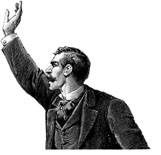
A Protestant View of Physical Gestures in Church Life
GESTURES DON'T DISCRIMINATE
There is an emerging crisis in churches across denominational lines concerning the place and presence of people with disabilities in congregations and parishes. The debate is over whether to integrate them into the total life of a congregation or to segregate them into some activities with others who are likewise disabled. Those who advocate their inclusion into the rush of church life, including worship, Sunday school programs, fellowship, and youth group activities, carry with them the hope that we will learn from one another’s different ways of being members of the body of Christ. However, the concern among others is that bringing people with disabilities like mental retardation into a church without special programs is a big mistake. Southern Baptist educator Gene Nabi asks, “are mentally retarded persons going to get the point of the Bible lessons?”
At issue is how we learn to receive the Good News of Jesus Christ. For a century or more, churches have been held captive by the public school paradigm of learning the Gospel. There is very little if any difference between how we learn in the public school or the church school. Whether it involves children’s ministry or adult education, pedagogical practice focuses on learning as an activity of the mind, rather than of mind, body, and spirit. And as the public schools have segregated people with disabilities out of the “normal” classroom into segregated programs, so churches have adopted the same approach, for learning the Gospel is said to be a thing of the mind, not of mind, body and spirit. But the human being is not primarily “mind,” but a complex, mysterious union of mind, body, and spirit.
Christians are a “peculiar people,” practicing what the world would consider strange gestures. Who else would love their enemies, lay down their life for friends, all the while praying without ceasing?
Both those labeled “disabled” and “able” are capable of learning gestures. Consider Sal, a “hugger,” a compassionate giver of hugs in the body of Christ. She would, if given the chance, throw herself upon you, with all 80 pounds of childhood kinetic energy, as she simultaneously asks whether she may hug you or not. I met Sal while she was living at an institution for children with disabilities. She was labeled mentally retarded, and as having an attention deficit/hyperactivity disorder, plus a speech impediment, but this didn’t slow her down.
You May Also Enjoy
Don’t tell me that intellectual standards are declining in England. Where in the U.S. could…
The Cross: History, Art, and Controversy... Matters of Life & Death: A Catholic Guide to the Moral Questions of Our Time
Michael Harrington was an eloquent, attractive leader and lucid thinker. Even those who disagreed with him found it almost impossible not to love him.

